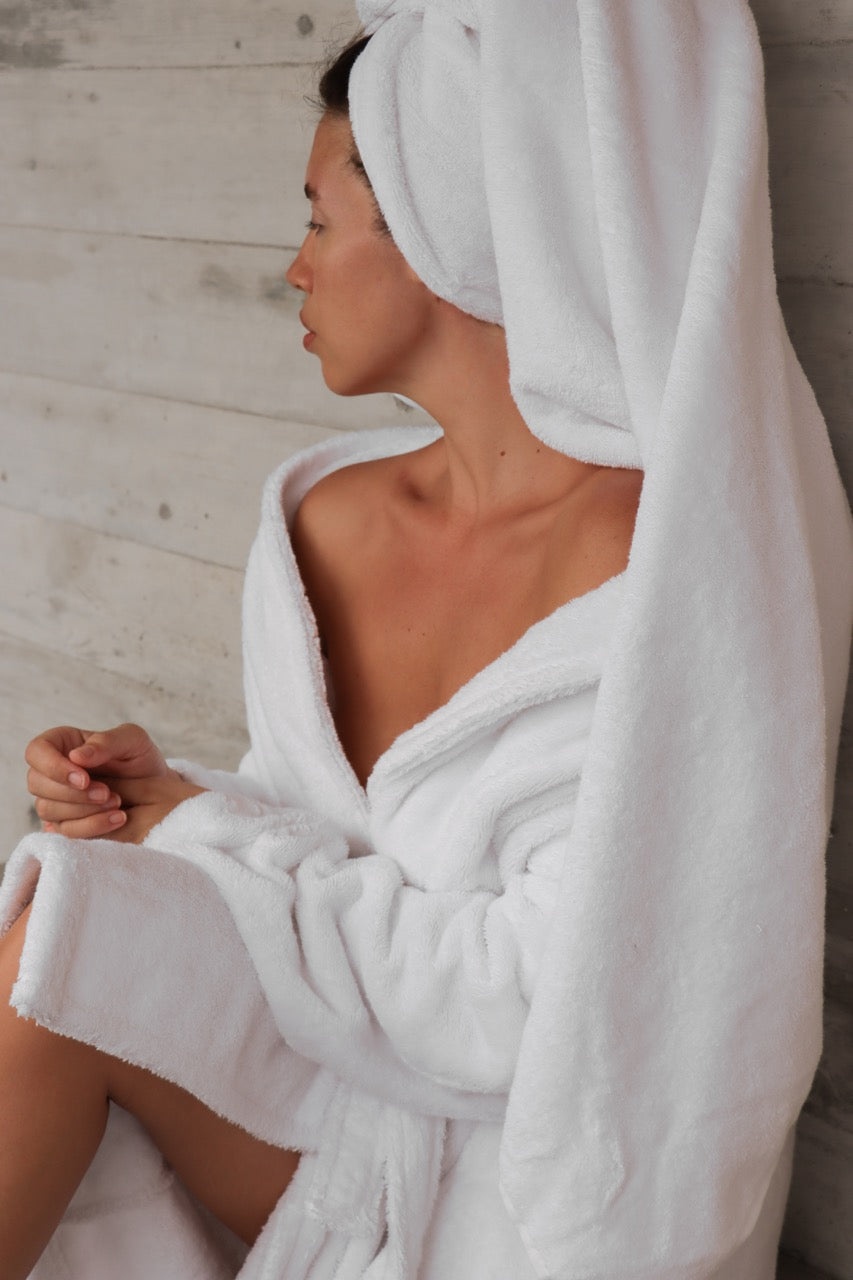Regardless of where you’re reading this, it’s guaranteed that you’re surrounded by fabric in some form.
Give yourself a few moments to scan your surroundings. Intricate carpets, light-blocking curtains, and everyday clothing. Home linens such as towels, tablecloths, bedding, and even much of our furniture. And that's only the start.
While it’s true that fabric is everywhere, not all textiles are created equal.
Did you know that many man-made fabrics and synthetic fibers can take 500+ years to decompose? In this case, we’re talking lycra and polyester, which are mainly made from plastics.
In the world of bedding, synthetic blends and microfibres often take priority as a way to focus on profits. Long-term side effects of these synthetics include allergies, rashes, insomnia, and other issues that can disrupt a good night’s sleep.
An unsuspecting culprit indeed.
That said, in recent years as this information has become more mainstream, many brands are going natural as people turn to sustainable and more mindful lifestyles.
Let’s take a dive into why you’ll benefit from investing in clean textiles and most importantly, where to start.
It’s these little changes that add up over time, after all!
The Key to Getting Better Sleep, Naturally? Opt for Sustainable Bedding
The average adult sleeps for ⅓ of their life, so it would be a disservice to all to leave out the ways in which our bedding impacts our bodies and health.

The Sleep Foundation lists 8 main benefits of sleep:
- Improved mood, leading to higher energy levels
- A healthy heart, due to our vascular system slowing down and getting rest
- Regulated blood sugar, as insulin helps blood sugar enter our cells for energy
- Enhanced mental performance, supported by neural connections that happen in the brain while we sleep
- Strengthened immune system, as during sleep the body is given a chance to restore and repair
- Stress relief, which stems from waking up feeling refreshed
- Athletic performance, in aiding the production of growth hormones
- Maintaining a healthy weight, by allowing the body to produce the appetite stimulant ghrelin
There’s no denying that sleep is an essential part of healthy living, as is creating an atmosphere where we can easily fall into rest. As we spend so much time sleeping, bed linens should be at the top of the list of the most important textiles in our day-to-day!
Natural fibers like cotton, bamboo, linen, and hemp are great for your skin and sleep quality. They're more breathable than synthetics and absorb moisture more quickly than other fabrics. This means they're better at regulating body temperature – an essential part of a comfortable night's sleep.
It’s also worth noting that organic and naturally-grown textiles don’t contain the harsh chemicals that commercially-produced textiles do. As the skin is our largest organ and acts as a sponge to our environment, this makes organic textiles much safer for both your health and the environment.

Harmful chemicals that can irritate the skin and trigger allergic responses are a common occurrence in synthetic fabrics like polyester and rayon. Polyester is a form of plastic that comes from petrol, after all.
Man-made fabrics also produce toxic fumes when burned or incinerated, which pollutes the air we breathe while also seeping through our skin and into our bodies.
If you suffer from allergies, temperature troubles, hitting that perfect level of comfort, or would like to incorporate more easy-care fabrics into your home, bedding is a fantastic place to start.
Organic Cotton and Linen Actually Save on Important Resources
It’s no secret that traditionally-grown cotton has negative impacts on the environment.
This includes:
- A large consumption of water
- The conversion of habitat to agricultural use
- Soil erosion and degradation
- Heavy use of pesticides and insecticides
It’s astounding to learn that cotton makes up about half of all textiles, so you can imagine the scale on which the above is playing out.
That said, when grown and manufactured with people and planet top of mind, the benefits of cotton outweigh any polyester or rayon tenfold.
In addition to minimizing the general consumption of textiles, if you’re on the hunt for cotton clothes, bedding, or bath, a great practice is to ensure that your cotton has been certified organic. The most popular certification, GOTS (Global Organic Textile Standard), regulates the manufacturing stages of raw materials like cotton and wool and ensures that requirements for both ecological and labour conditions are met.

It’s critical that we ask more from the companies from which we buy – don’t underestimate the power of voting with your dollar. If you have questions about the sourcing of products that maybe isn’t clear on a brand’s site or socials, never hesitate to reach out directly or through their customer support lines.
And us? You can relax knowing that every one of our products comes from GOTS-certified manufacturers.
When it comes to linen, the mighty flax plant from which it’s made requires little water to grow, can improve the quality of the soil in which it grows, can adapt to a variety of climates (lessening its carbon footprint), and is relatively energy efficient.
There’s no wonder humans have been using linen since the dawn of civilization.
Now to compare production methods of synthetics vs natural fibers. (Hint hint – natural all the way!)
Negative Impacts of the Production of Synthetic Fabrics
- Produced using methods that require fossil fuels, such as oil and natural gas.
- Their production, consumption, and disposal result in the release of microplastics, the use of non-renewable resources, and generate greenhouse gas emissions.
- Synthetic fibers aren’t biodegradable, meaning that once they’re created, they’re here to stay.
Why Natural Fabric Is the Better Choice
- Produce less waste during production since they use fewer resources than synthetic textiles.
- Biodegradable, unlike synthetic materials.
- Widely available in nature.
As you can see, opting for natural fabrics over synthetics is a small step we can take toward lessening the environmental toll on our planet.
Choosing to purchase natural and certified organic is a way to support and uplift brands that care about preserving natural resources and the well-being of all involved in production.
Less Waste, More Quality Wear
As with fine wine, some fabrics actually get better with age.

We hear this often with linen, a by-product of the flax plant fibers that are spun into thread. Heat, movement, and tension on the fibers of linen actually enhance its softness and strength. With every day that goes by, it gets suppler, more resilient, and more unique to each individual and lifestyle.
What’s great about linen as well is that it gives a gentle and natural wrinkle – perfect for adding an air of coziness and a lived-in feel that makes beds so inviting.
You may or may not have noticed with some of your favourite clothing items, or even kitchen or bath towels: synthetic fabrics tend to pill and fade with wear and tear. Natural fabrics, on the other hand, typically continue to stay soft and smooth even after repeated use.
On the note of caring for your linens, natural fiber gains a point over synthetics and blends in the realm of wash and care.
Although you should always check your wash and care tags, most cotton and linens recommend a wash on cold with a light detergent and a tumble dry or hang to save on energy. Less is more!
Here to Help Make the Switch to Sustainable Living Easy
If you're concerned about the future of our environment, making planet-forward choices like choosing natural fabric is a simple way to do your part. Thankfully, there are more companies in every niche producing natural products today than ever before, and useful information to inform your decisions is just a click away.
As a brand in the textile space, we’re proud to create the highest quality products with sustainability as our guiding light and excited to witness the ongoing development of sustainable fabrics in the future.
To make the switch to eco-friendly bedding and bath and feel the difference for yourself, check out our collection of organic Turkish cotton towels, robes, organic cotton bedding sets, and more!




